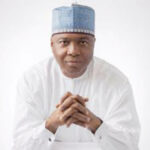In stimulating community wealth creation, it is should not be solely government’s responsibility. It requires all stakeholders in the society who have ideas, resources, skills and knowledge to offer to do so. I am concerned about the poverty in many of our communities in the midst of quantum resources and endowments. One of the ways to turn around the fortunes of many Community dwellers in Nigeria will be through an agricultural revolution that cascades down to affecting the lives of small-scale farmers as well as medium and large scale farmers.—— I need to share with readers the Songhai success story enabled by a visionary Nigerian who saw ahead the food crisis to which Africa was moving and came up with an idea that has given birth to a world-class, African-authored, integrated, zero-waste and sustainable farming business. The Songhai Centre, Beinin Republic, todayhas become a realistic, affordable way of keeping unemployment, hunger, and poverty at bay.—- In the early 1980s, a small group of people led by Rev. Father Godfrey Nzamujowere determined that the level of development in Africa was grossly insufficient and sought to restore African dignity by creating a centre for the training, agricultural production, research and development of sustainable agricultural practices.The Songhai model was designed as a robust zero-waste, integrated agro-allied model promoting rural growth through training, technology adaptation and research from a strong business standpoint.—- Rev. Father Nzamujocalled the centre Songhai, a name borrowed from a prosperous West African empire that flourished in the 15th century. The promoter believes the nameinspires pride and hope for a prosperous Africa. Founded in October 1985, Songhai was an attempt to replicate the world-famous civilisation which happened some centuries earlier. I understand that the Catholic Priest, who also holds a Doctor of Philosophy degree in Electronics, Development Science and Microbiology, had visited Nigeria with his novel idea but when he was not making any headway turned to the Beninese government which saw the potential in his idea and gave him a piece of land to start his innovation. Today, the Songhai Centre, in three locations in Benin Republic,Porto Novo, Savalou and Parakou, is a huge testament to the power of vision and innovation. Vision does not respect age, colour, height, race or religion. Anyone with a great vision and commitment to innovation can make miracles happen.—– While Songhai Centre was transforming the agricultural landscape in Benin Republic, Nigeria for many years has been dependent on food imports. Our country still imports rice and other food items that we can produce in the country. Our agricultural productivity seems to be locked up where it was in 1960 because the amount invested in the sector is still relatively low. The former government tried to revamp the sector but as long as we expect the transformation in that sector to be led by government alone, development in that sector will happen in a snailpaced way. Rev. Father Nzamujo points to Subsistence farming, non-development of the opportunities offered by demographic growth, among others as the problems plaguing development and food sufficiency in Africa. We expect the no-nonsense government of President Buhari to provide the leadership and support needed to transform this sector and free the great resources trapped in many Nigerian communities. Agriculture should be the backbone of the Nigerian economy and because it is one sector with the capacity to create hundreds of thousands of jobs in the nation, government needs to pay more attention to the sector. Agriculture is related to all sectors of the economy and can improve the nation’s economy if properly harnessed. Even the industrialisation that we all desire can only be supported and made sustainable when there is a vibrant agricultural sector that provides raw materials that would feed our industrial operations. Our research institutes, universities and schools of agriculture must unlearn and relearn ways to engage industry with their findings so that their research findings can add value to the quest for Nigeria to become a food powerhouse in Africa. Father Godfrey Nzamujo has proved that it can be done. Without a degree in Agriculture, he has created an integrated farm model that has increased agro-tourists from Nigeria, the rest of Africa and the world to go and visit the Songhai Centres and learn how this can be replicated in their countries. His vision especially has made it possible to achieve grassroots agricultural development and inspired the best and the brightest to join him. He has created a center of excellence by finding the best people, the best technology and the right markets for local agricultural products.The Songhai Centre provides a showcase that combines crop production, aquaculture and livestock production. This, the output of one leg of the farm process (e.g., chicken manure), becomes the input for another. His farm architecture embraces the recycling of water and waste into biogas, fertilizer, and others and creates a system with minimum environmental impact and almost zero waste. At Songhai, they are raising thousands of animals (chickens, turkeys, quail, ducks, guinea fowl,pigs, rabbits and enormous guinea pigs called "grass cutters") and yet there isno smell of manure because the wastes are converted to energy or processed as feed. The farm products are of the highest quality. The farm is a researchdriven farm. For instance, Tilapia and cows are bred using artificial insemination. Again, Songhai scientists have developed a rice variety which excels in lower moisture climates. The centre recycles waste metal and fabricates its own farm equipment.They also maximise value by processing many finished products (soap, baked goods, juices, jams, syrups, animal feed, etc.), while other farm products are sold in Songhai stores and to wholesalers and retailers. Not only has the centre turned a profit every year since 1988, but many of Father Godfrey’s graduates have become agricultural entrepreneurs who are also excellent business people, transforming their own lives, those of their families and their communities through their training and expertise. The success story of the Songhai Centre has even attracted the United Nations which has consulted the Centre to expand its program to 15 countries, and possibly to the whole of Africa. If replicated in Nigeria, lessons learnt from the Songhai success story can change our agricultural system bottom-up. To stem the brain drain, youth restiveness and unemployment we are facing as a nation, government must partner with interested stakeholders to transform the agricultural sector with focus on engaging the small holder farmers. This was the reason I started the series on Cooperative business as a way to deliver small farmers from remaining at the subsistence level. By "cooperating", small-holder farmers can transform into mechanised and integrated farms, and employing the Songhai model will change the face of farming business in the country. Take for instance,Nigerian governments spend a lot of money clearing water hyacinth annually, but in Songhai Farm, water hyacinth is used for purification and biogas. The dung from poultry is also used for biogas while in Nigeria we spend so much money to get rid of it from our poultries. A farm model that offers these services must be taken very seriously: Biogas Technology, Greenhouse Farms, Open Farms, Fish Ponds, Waste Recycling, Engineering and Fabrication Workshop, Rice Farm, Processing Centres and a Plastic Production Factory. See you in the next edition.
 Join Daily Trust WhatsApp Community For Quick Access To News and Happenings Around You.
Join Daily Trust WhatsApp Community For Quick Access To News and Happenings Around You.


